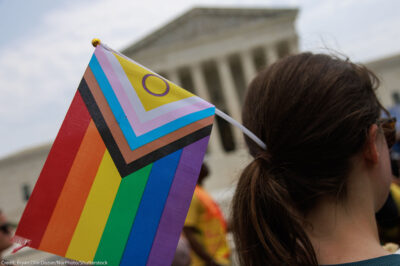A recent Florida federal court decision in an ACLU case did a lot more than simply make advocates for both reproductive freedom and for lesbian, gay, bisexual, and transgender rights very happy: It signaled that the days when folks could get away with making outlandish anti-LGBT arguments are going, going, and almost gone.
Ruling in favor of students who wanted to start a gay-straight alliance club at Okeechobee High School, a conservative judge found that school officials had violated the federal Equal Access Act, which guarantees the right of students in public schools to form clubs. And he clearly didn’t buy the school’s excuse that it should get off the hook for blocking the GSA because it receives federal funds for its “abstinence-only” program. A gay-straight alliance, the school had argued, is a “sex-based” club — which was news to the students who only wanted to talk about how to cut down on anti-gay bullying at their school and have the occasional pizza party.
In the ruling, the court recognized what those of us who advocate for comprehensive sex education have known for years: In addition to being a colossal failure for heterosexual teens, federally-funded abstinence-only-until-marriage programs by definition exclude LGBT teens. Recipients of this money ($1.5 billion to date and counting) must teach that “a mutually faithful monogamous relationship in the context of marriage is the expected standard of human sexual activity” and that “bearing children out-of-wedlock is likely to have harmful consequences for the child, the child’s parents, and society.” Now take the federal definition of “marriage” that applies to these programs — that marriage is limited to a man and a woman — and combine it with the fact that same-sex couples cannot marry in all but two states, and voila: the result is that abstinence-only-until-marriage programs discriminate against LGBT students.
The judge in this case — again, the kind of judge that no one would call an "activist" — gets this concept. The court dismissed the school district’s nonsensical argument that recognizing a GSA would conflicts with the well-being of students because it conflicts with the school’s abstinence-only program. In fact, the court found just the opposite: It's not the GSA that would harm the well-being of students but the abstinence-only programs that do so by excluding them.
For example, the court noted that abstinence-only programs “do not provide information of a kind usable by non-heterosexuals to prevent disease.” And it implicitly recognized that LGBT individuals have a right to form intimate relationships and to parent, noting that teaching about the benefits that accrue to children with married parents is of “little use to . . . non-heterosexual students who may aspire to parenting but lack the prospect of a legally sanctioned marriage.” The court concluded by saying that abstinence-only-until-marriage programs are therefore of “limited utility to . . . non-heterosexual students, the well-being of whom must also be considered.”
You've got to wish that the lawmakers in Washington, D.C., would get it too — that they'd stop the flow of abstinence-only-until-marriage dollars into discriminatory, ineffective programs. But no, it's politics as usual in D.C., and while there's some empty rhetoric about how useless ab-only is, it isn't accompanied by the political will to actually pull the funding from this costly failed experiment.
Maybe this will be the last we see of this latest, desperate tactic used to bar students from fighting LGBT harassment in schools by forming GSAs. As for the students in the GSA, they’re just excited that they’ll finally be getting the club off the ground when school starts later this month. Pizza, anyone?
— Brigitte Amiri and Chris Hampton




